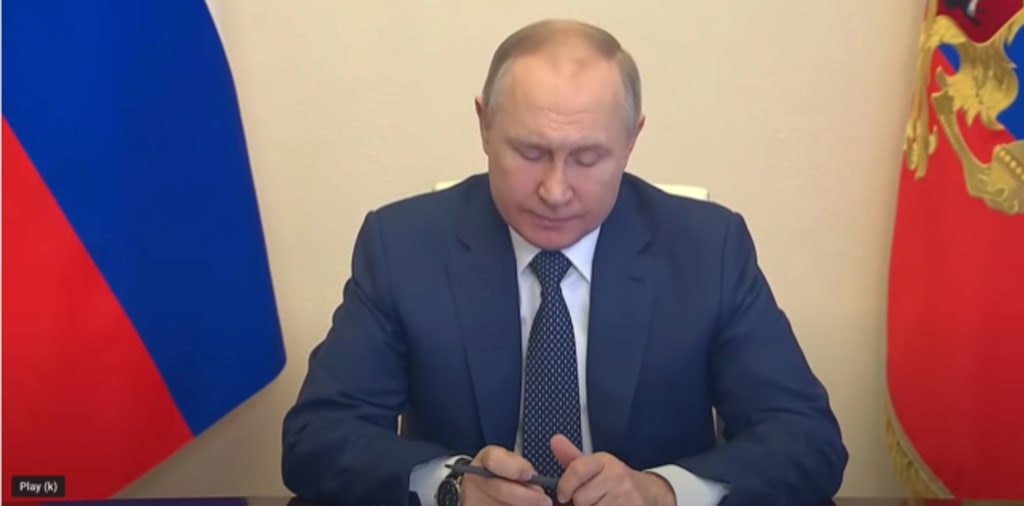The 5 Blunders of Vladimir Putin
The dictator's idiotic elective war is destined to be lost, and was so before the first shot was even fired. Here's why

The war in Ukraine is two months along, and Russian president Vladimir Putin’s dangerously quixotic quest to restore the geography and influence of the old Soviet Union is not going as planned. According to news reports, Russian forces have been frustrated, losing control of towns once thought to be under their control, and were more recently forced to endure the sinking of one of their flagship warships, the Moskva, probably at Ukrainian hands. Other news reports and analysis from the Pentagon have said Russian troops are deeply demoralized, undersupplied, and confused as to the very nature of the mission.
And for all the fear and teeth-gnashing concern over the Russian military’s potential for scorched-earth warfare in Ukraine, and the equal or greater fear of Russia using chemical weapons or tactical nukes against Ukraine’s people, there are five mistakes – substantive, hand-to-the-forehead blunders – that Putin committed, unforced errors the dictator made that effectively lost this war before the first shot was fired, errors that will end it in fact sooner rather than later, and not on Putin’s terms.
1) Putin overestimated the efficacy of his own military.
As a rule, dictators don’t just parrot the glowing assessments of their military forces; they help create those narratives of invincibility – and not coincidentally reinforcing their own. Russian troops entered Ukraine with a (short-lived) shortage of supplies and equipment, but with the overweening confidence that they could duplicate the grim battlefield successes in Syria of 2016 and 2017, there in Ukraine. That confidence led to assumptions on the ground that couldn’t be replicated. Ukraine, Russia’s direct neighbor, is not Syria, a country thousands of miles from either Ukraine or Russia. From the start there were logistical challenges, the kind that emerge when you try to move 190,000 troops – hell, 190,000 of anything – from one place to another on short notice.
Other challenges, and other problems, have developed for the Russian military, but they weren’t anything that couldn’t have been predicted. U.S. Army Capt. Nicolas Fiore studied the tactics of Russian battalion tactical groups, or BTGs, while in Ukraine from 2014 to 2015. His assessment of the Russian military posture is documented in a brief by Seth Jones, Joseph Bermudez Jr., and Philip Wasielewski, published on the Center for Strategic and International Studies website on Jan. 27, almost a month before the February invasion.
This is the authors’ synthesis of Fiore’s conclusions: “After analyzing numerous Russian combat operations in eastern Ukraine, he noted Russian army strengths but also weaknesses. On several occasions, Russian BTGs were defeated by Ukrainian regular army units despite an overmatch in firepower, electronic warfare, and air defense artillery capabilities. During the fighting in eastern Ukraine, Russian BTGs could not quickly regenerate combat power. Once teams and units were degraded by casualties, they rapidly lost effectiveness until they were completely reconstituted.
“Regarding logistics, Russian BTGs required road and bridge networks because their light trucks did not have the same mobility as their combat vehicles. This lack of logistics support may have prevented Russian BTGs from pursuing defeated Ukrainian units, which were often able to reform themselves less than 30 miles from their old positions. Other weak points were an overreliance on artillery, a limited number of infantrymen in each BTG to hold ground and conduct security operations, a risk aversion to endangering infantrymen and infantry fighting vehicles, an overworked command and control system, and limited medical evacuation and field treatment resources for the wounded.”
2) Putin underestimated the personal affinities and connections that Russia has with Ukraine and its people.
It’s hard to truly objectify your friends, former neighbors, and your relatives. That’s what’s now facing Russian troops, many of them knowing that the history of Ukraine as (wary) neighbor and (equally wary) friend to Russia is longer than their history as outright antagonists. Many Russians embrace Ukraine as another source of common history and heritage, and (Putin’s nationalistic bluster notwithstanding) they respect its independence, despite its increasing overtures toward the West.
A 2021 survey by the Levada Center, a Russia-based polling and research organization, found that 23 percent of Russians think Ukraine and Russia should remain friends, but with separate, distinct borders. The survey found that only 17 percent of those who responded were willing to support Ukraine and Russia being unified. And younger Russians were more favorably disposed to Ukrainians than their older counterparts. Those numbers have certainly moved since Feb. 24th.
That enduring historical relationship between Ukraine and Russia – their people, not their governments -- explains why recent videos have surfaced showing Russian troops and armored forces voluntarily retreating in the face of Ukrainian civilians. Those lives have been too intermingled, too interwoven, for that not to happen.
3) Putin picked the wrong time of year to weaponize his energy resources.
One of the knock-on effects of the Ukraine war has been its impact on energy access and prices across Europe. According to the International Energy Agency, in 2021, “the European Union imported 155 billion cubic meters of natural gas from Russia, accounting for around 45% of EU gas imports and close to 40% of its total gas consumption.”
This indicates a continent deeply dependent on Moscow for its energy needs. Putin no doubt counted on leveraging that fact as a hedge against any meddling from Europe or NATO when he launched the Ukrainian invasion on Feb. 24.
But hey, if you’re cruel enough to try using energy to your advantage in a war of your own invention (among other, deadlier forms of gaining advantage), it goes without saying that you’ll be too arrogant to even look at the calendar to see how your leverage might be compromised.
If Putin had done that, he may have understood that launching a war on Feb. 24th, less than four weeks before spring, might not get him as much control as starting that war on, say, September 24th or October 24th. As it is, with temperatures climbing across Europe, there’s less demand now for the Russian gas and oil Europe depends on than there would have been in the fall or early winter. With an economy already under pressure, and now facing hundreds of billions of dollars in ruinous sanctions and trade restrictions, Putin needs to maximize his resources’ potential, not hurt it.
Some of which may not matter soon: President Biden, visiting EU leaders in Brussels on March 25, announced a deal with the European Commission to create a joint task force to ensure energy security, and to supply EU nations with more liquified natural gas deliveries, helping to make up for any shortages Putin might engineer.
There’s nothing like undercutting the leverage of your own commodities to make sure you lose a war.
4) Putin underestimated the resolve of the West.
When Putin started this needless conflict, some part of his decision-making process was connecting to the Western powers from another time. To one degree or another, the Putin calculus relied on the continued fractious relationship between Europe, NATO and a United States under Donald Trump, a president with little affinity for compacts and agreements established in the wake of World War II.
The U.S.-Europe-NATO relationship under President Joe Biden is another matter entirely. With Biden, an institutionalist to his core, those bonds have been revived and fortified. The U.S.-EU relationship, rocked by Trump’s bulldozer-in-a-china-shop style, has lately been steadied by Biden’s surer and more experienced hand at global relations. That’s led to a solid bloc of economic sanctions from the EU in concert with the United States – and a commonality, a fellow feeling that routs what were probably Putin’s more cynical assumptions.
5) Putin underestimated the people of Ukraine.
Of all the mistakes Putin made in the run-up to the war, this is the most serious, and the one that will most convincingly seal the fate of this toxic enterprise. The Russian president – part spymaster, part apex predator – conjured an outcome for his war that had Russian forces gamely grappling their way through a tough but ultimately compliant Ukraine, city by city – and winning decisively, using the metrics and machinery of modern warfare to drag Ukraine, kicking and screaming, back into its orbit.
Since then, the people of Ukraine have sent a message: The game done changed on multiple fronts. Since the war began, Ukraine and its people have astounded the world with their strong, nimble, muscular military response to the Russian incursion, taking out troops, tanks, and artillery. Recent estimates place Russian military fatalities at between 7,000 and 15,000. In the first month.
Ukraine has also confronted Russia in cyberspace, hacking government networks and stealing data crucial to the Russian war effort. On March 25, cybersecurity expert and author Jeffrey Carr told NBC News that the Ukrainians have been “successful in keeping Russian attacks from disrupting their power grid and other critical infrastructure. At the same time, their offensive side is hitting Russia very hard with these extractions of data from ... high-profile targets.”
This has also been a war of everyday people. Whether they’re training with wooden machine-gun replicas or manufacturing Molotov cocktails by literally the tens of thousands, motivated Ukrainian citizens have taken the call to defend their country personally. Very personally.
And at the statecraft level, Ukraine has excelled on the world stage in the elevated profile of its president, Vlodomyr Zelenskyy, the former actor and stand-up comedian for whom the defense of his country is no laughing matter. In serial video addresses before lawmakers in Europe and the United States, Zelenskyy has articulated the stakes of the world in the outcome of this war with ringing, powerful oratory that many have likened to Winston Churchill in the darkest hours of World War II.
Putin’s misreading of a country he proposes to conquer is hand in glove with the most fatal blunder of all: not reading his own country’s history, failing to learn from it, ignoring the lesson that a better Russia gave the world through the agonies of World War II.
It’s a lesson the Ukrainians are all too happy to teach again:
Never underestimate the capacity of a nation’s people to be the people of a Nation.
About the Creator
Michael Eric Ross
Michael Eric Ross writes from Los Angeles on politics, race, pop culture, and other subjects. His writing has also appeared in TheWrap, Medium, PopMatters, The New York Times, Entertainment Weekly, msnbc.com, Salon, and other publications.






Comments
There are no comments for this story
Be the first to respond and start the conversation.